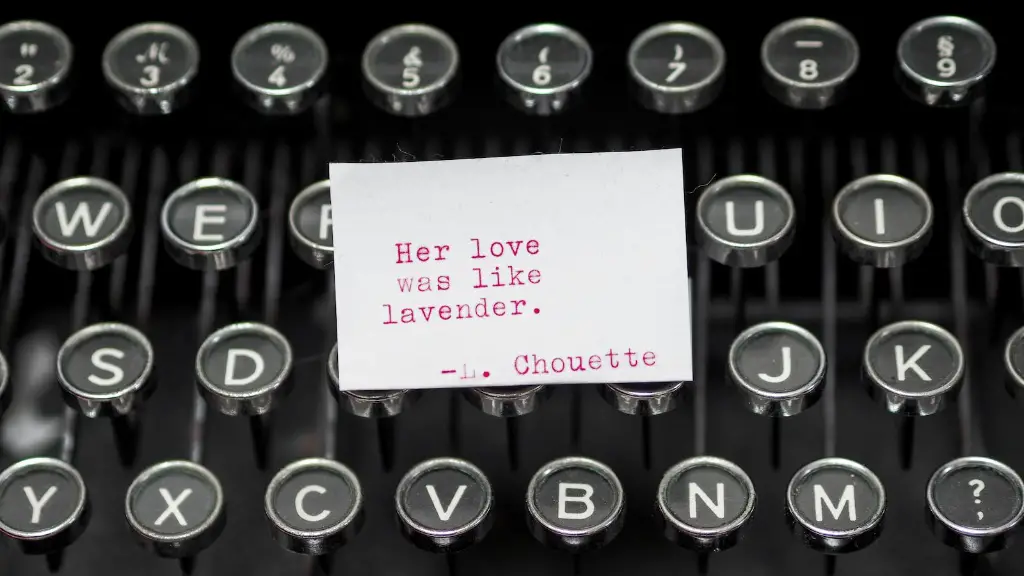Who Killed Poetry?
The popular opinion of poetry’s alleged death ranges from mourning its departure to treating it as an overhyped myth. It is no secret that poetry has been around for centuries, just like the human race. Poetry was thought to be a form of literary expression that transcended the ages. So what caused its death?
Professor Jennifer deVere Brody, founder of the Poetry and Politics Initiative at Stanford University, believes that the death of poetry is due to the lack of its impact on the political arena. “It’s not that people don’t appreciate poetry anymore, it’s just that its power to provoke and activate has diminished,” Brody says.
In the past, poetry was a powerful tool to mobilize people; a tool of self-expression and a way to communicate with society. Poet laureate of the United States, Joy Harjo, describes how poetry has the ability to “reach people no other words can reach”.
However, in the age of technology, poetry is often considered a “niche genre” and is less popular than it once was, according to Professor Brody. This phenomenon is partly due to the fact that “poetic language fails to exist in the world of binary coding,” she says. On the other hand, news, political stories, and advertisements have taken over the written and spoken word space, leaving poetry’s influence and impact minimized.
In an attempt to revive poetry, some artists are using modern technology to create interactive and visual poems, while others are focusing on the art of listening and speaking poetry. There is a movement called Spoken Word that has been gaining momentum and is being used to spread both poetry and spoken-word performance art. This is an example of how modern technologies have been harnessed in order to reach out to a wider audience and to engage them with poetic language.
Despite the attempts of modern technology and creative artists, it does not seem as though poetry will ever reach the same status that it once held. Even in its death, poetry continues to be an important tool for self-expression and, as Harjo states; “it will take all of us to imagine a world of possibilities, of humanity, of joy, of moving forward again.”
Poets Over Time
Poets have been around for centuries, and throughout history, they have been the ones to bring crucial ideas and concepts to light. Some of the iconic poets of the 20th century have included Langston Hughes and Maya Angelou. They wrote poetry that focused on topics such as racism, feminism and social justice. Early on, they spoke up on matters many people were not interested in discussing, and their works have influenced writers, thinkers and feminists throughout the years.
However, with the rise of technology, we are seeing a decrease in the influence of poetry. The “spoken word” movement is helping to bring the old-fashioned poem form back in popularity, but it is not enough to make up for the fact that poetry does not have the reach or impact that it once did.
Furthermore, the focus on self-expression has been replaced by self-documentation. Writers today write in a style that records their personal experiences and feelings. This style of writing does not share the same political or poetic power that poets of the past had, and it indicates a shift in the purpose of writing.
Recently, there has also been a lack of financial support for poets as publishing houses have become hesitant to fund books written in the more classical form of poetry. This lack of funds has led to many poets writing on topics that don’t necessarily capture the same passion or insights of their most celebrated works.
Digital Publishing
The impacts of digital publishing have had an enormous impact on the poetry world. Traditional books have gradually been replaced by e-books, and with that, many have lost the connection to the form. Books tend to give readers more of an immersive experience than an e-book ever could.
Furthermore, with the rise of digital media, younger generations are more exposed to shorter forms of writing such as tweets, Instagram captions, and short blogs. Writing poetry in long-form has become daunting for those who find comfort in the immediacy of the internet.
As the public changes, traditional poetry loses its appeal and people move away from longer, more intricate pieces. Digital media is combining with the shorter forms of writing and creating a landscape that is leaving many of the old classic poetic forms in the dust.
The Brain and Poetry
Recent research has explored the neurological effects of poetry; finding that when we read or hear a poem, we activate certain parts of the brain. The words of the poem activate certain pathways in the brain as it processes information and creates a visual or mental image of a particular scene.
This allows the reader to experience a different type of feeling then one that would occur when reading something dry or factual. Poetry allows the reader to be creative and evoke feelings that would not arise from a typical post or article.
Recent brain research is showing us that poetry can still be powerful and affective in today’s world. It could be argued that poetry has not died, but instead has developed in a way that appeals to the reading habits of modern writers and readers.
The Business of Poetry
The business of poetry is changing as well. Poets must find new ways to market and publish their work, since the traditional methods of doing so are becoming less and less lucrative. Social media and crowdfunding are becoming popular methods of generating income and interest in poetry.
For example, many poets have started Patreon accounts in order to gain financial security, and Youtube channels to attract a larger following. At the same time, there has been an increase in poetry contests and awards as a way for poets to gain recognition for their work.
The business side of poetry can be difficult to navigate, and the ever-changing landscape of the world of poetry can be overwhelming. Those who want to make a living from their poetry must stay informed, explore new methods of marketing, be technologically literate and most of all, be able to stand out from the crowd.
Poetry’s Impact
Ultimately, poetry is still capable of making an impact in today’s world. It is still a powerful tool that can be used to communicate one’s thoughts and feelings, and can still reach people on a greater level than other forms of writing. The question is whether it will be enough to resurrect the genre.
Those in the poetry world must do more to spread its influence and its financial benefits. Forward-thinking poets are combining their love of language with newer forms of technology and digital marketing strategies, which could be the key to its comeback. For now, the question is still open—who killed poetry?





